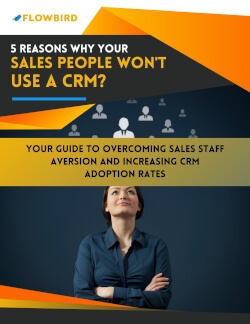On the surface, CRM and marketing automation seem synonymous, and while they are indeed similar in some ways, they serve distinct purposes. In this post, we break down the basics of CRM and marketing automation tools so you can better understand how they benefit your business individually and in conjunction. 
What is marketing automation software?
As the name suggests, marketing automation can streamline time-consuming marketing tasks, such as segmentation, lead generation, and lead scoring. With the use of workflows, it can execute campaigns and carry out marketing tasks when a lead (someone with the potential to be a customer) performs a particular action or meets a predefined condition. For example, if a lead downloads a free ebook, you could nurture that lead by emailing them more content they’d likely be interested in.
Marketing automation eliminates tedious tasks, makes your team more efficient, and eliminates guesswork when deciding which content is most relevant to your customers. In addition, it allows you to launch a wide range of campaigns to an infinite number of customers at once while freeing up time for more critical tasks.
Here are other reasons why a marketing automation tool is a must-have:
It lets you identify and prioritise promising leads
Don’t waste your time on all leads – not all are worth your time. Marketing automation tools can be used to identify which leads to prioritisation based on their potential to become loyal customers. Here’s how it works: you set points for specific actions your leads can take (e.g. the number of times they’ve visited your website), and when they reach a certain score, you can automatically hand them over to sales.
It increases your qualified leads.
According to Epsilon, 80% of customers are likelier to do business with brands that offer a tailored experience. When you show your customers relevant content, they’re more likely to become qualified leads – customers who are more likely to buy. Marketing automation also lets you regularly roll out content with less effort, strengthening your relationship with your customers, earning their trust, and building your credibility – all essential to generating good leads.
It provides an opportunity to personalise your marketing strategies.
Remember that an individual’s needs at the top of the funnel won’t be the same as those at the bottom. For example, someone who has just discovered your brand won’t be ready to buy your products, so it wouldn’t make sense to show them the same marketing materials as past customers. Marketing automation lets you ensure you show the right content at the right time based on where they are in the buyer’s journey.
What is CRM?
Customer Relationship Management (CRM) is a system that allows you to streamline and track your relationships with your prospects across the customer lifecycle. It consolidates all contact-relevant data (e.g. names, emails, communication history, purchase history, etc. ) in one central location, allowing you to know everything there is to know about your customers.
CRM gives you a 360-degree view of every customer so you can give them exactly what they want. This way, you can build long-term relationships with your contacts, establish a loyal customer base, and boost your sales.
Let’s dig a little deeper and go over the advantages of using a CRM:
It consolidates customer data
With the rise of remote work, it’s crucial to store your company’s data in one place, where it can be accessed by every team member, wherever they may be. CRM software centralises all of your data, allowing teams to collaborate better. Employees can also leave notes on each contact’s account to ensure everyone is on the same page.
It enhances the customer experience.
CRM offers your teams a complete, historical context of your customers. You can see what they’ve purchased, what products they’ve viewed, their patterns, and much more. This enables you to better anticipate their needs and cross-sell products they’d likely be interested in. CRMs also allow you to maintain communication (such as sending “thank you” emails after a purchase), improving the customer experience and increasing retention.
It tracks customers throughout their journey.
As your business grows, you’ll inevitably have to deal with more customers. CRM systems provide an overview of all your prospects, including their positions in the sales pipeline, so you don’t lose a single chance to close a sale. Not only will a CRM allow you to keep tabs on your best leads, but it also lets you tailor your sales approach to their needs.
Should you use CRM or marketing automation tools?
If you’re wondering whether you should use CRM or marketing automation tools, we have good news: you don’t have to choose. You’ll find it beneficial to use them in tandem.
CRM is mainly a sales tool, while marketing automation is a marketing tool. Since you’ll likely have a marketing team to generate leads and a sales team to close sales, it makes sense to use them together. Once your marketing team deems their leads “sales-ready,” they can hand them over to the sales team, where they can further enhance their experience and convert them into loyal customers.
Think of it this way – marketing automation generates momentum with your customers, while CRM keeps that momentum.
Are you looking for a CRM with marketing automation?
Whatever industry you’re in—e-commerce, healthcare, or even cannabis—choosing a CRM tool that can handle marketing automation is crucial to your business’ success. With both platforms in your arsenal, you can expand your customer base and maximise the relationship you’ve built with them over time.
If you need advice on choosing a tool with CRM and marketing automation capabilities or more information on these solutions, book a consultation with Flowbird today. We’ll evaluate your needs and help you determine the best software for your business.